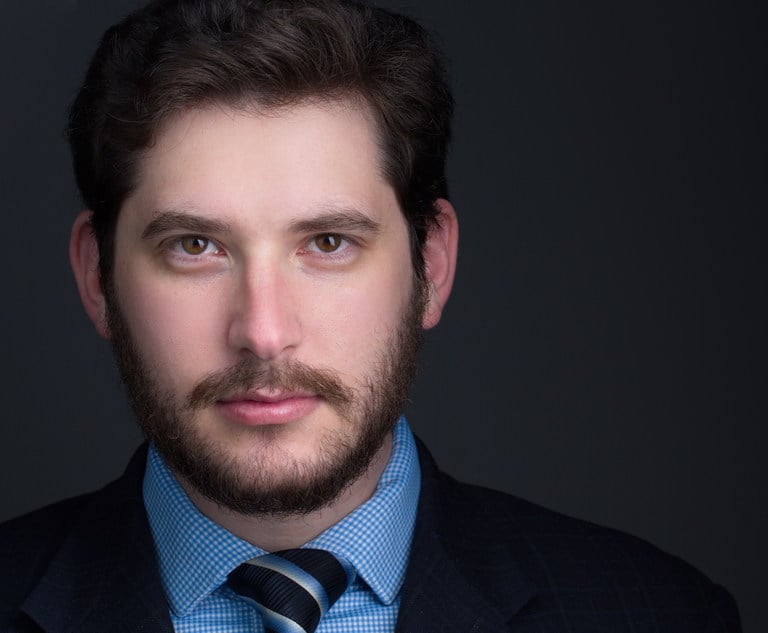Florida Bar Wants Broward Lawyer Suspended Over 'Social Media Blitz' Against Opposing Counsel
The Florida Bar claims Fort Lauderdale attorney Ashley Ann Krapacs used social media to launch "an attack of massive and continuous proprtions" against other attorneys. But Krapacs claims she turned to social media because her complaints to the bar had fallen by the wayside.
February 22, 2019 at 03:04 PM
7 minute read
 The Florida Bar accused South Florida attorney Ashley Krapacs of launching a “social media blitz” against attorneys Russell J. Williams and Nisha Bacchus. Photo: Twin Design/Shutterstock.com
The Florida Bar accused South Florida attorney Ashley Krapacs of launching a “social media blitz” against attorneys Russell J. Williams and Nisha Bacchus. Photo: Twin Design/Shutterstock.com
The Florida Bar has asked high court justices to suspend Fort Lauderdale attorney Ashley Ann Krapacs, claiming she used social media to launch ”an attack of massive and continuous proportions” against Fort Lauderdale lawyers Russell J. Williams and Nisha Bacchus.
“Clearly, respondent's fury has no bounds,” the bar said in an emergency petition filed Wednesday, adding that Krapacs' actions “strike at the heart of conduct prejudicial to the administration of justice.”
Krapacs began the “social media blitz” in March 2018, according to the petition, which says she called Williams an “old white male attorney” and claimed he harassed her with baseless legal action. She also encouraged people to track down Bacchus' former clients, pointing to a small claims case brought against Bacchus and alleging she'd bungled cases.
Krapacs disputes the allegations in the petition, and claims she turned to social media because she'd exhausted the traditional channels, via numerous court filings and letters to the bar.
“I'm an attorney. I take this field very seriously, and I was shocked and appalled not only by Russell Williams' behavior but also how the judge treated me,” Krapacs said. ”I haven't posted anything that wasn't either truthful or subjective opinion, so it's frustrating that I've had to defend that.”
But according to Williams, the past year has been an ordeal.
“It's caused me sleepless nights, just because [Krapacs] gets so angry,” Williams said. “And there's nothing that she said that's remotely true.”
Both Williams and Krapacs say they've never spoken outside the courtroom.
What happened?
Trouble arose when Williams began representing Krapac's Texas-based ex-boyfriend, whom she claimed sexually abused her. Krapacs moved to Florida after they split and, on Jan. 30, 2018, asked the court for a domestic violence injunction.
“I sought the protection of the court to get my ex-boyfriend off my back,” Krapacs said. “I filed a restraining order and was basically completely prohibited from moving the case forward. I was litigating it myself, so I obviously wasn't perfect. This was not my area. But there were things that were happening that were just bizarre.”
Williams' client denied the allegations and filed a motion to dismiss, citing a lack of jurisdiction. The judge granted it, but then asked Williams if he'd received Krapacs' amended pleading. According to a transcript of the April 12 hearing, Williams initially said no, then realized he had received the document and corrected himself.
Krapacs reacted to the incident in a LinkedIn post, saying, “Oh, and opposing counsel blatantly, flat-out LIED on the record. The judge didn't even bat an eye.”
Krapacs also filed a bar complaint against Williams, which was ultimately dismissed.
“It is outrageous that respondent paints Mr. Williams as a liar based on this exchange,” Wednesday's petition said.
The bar also pointed to articles Krapacs posted through her law firm, accusing Broward Circuit Judge Michael G. Kaplan of subtle bias, saying, “The Old Boy's Club is alive and well in 2018.”
Krapacs said the judge continuously interrupted her, and she tried to have him removed from the case but was denied.
Read the bar's petition:
Krapacs voluntarily withdrew the domestic violence petition on July 24, 2018, and the court dismissed it without prejudice. Days later, Williams filed a defamation lawsuit against Krapacs over her posts, which he said were hard to ignore.
“It was very difficult for me not to respond and post things and put up [Krapacs'] stuff. And for Nisha as well,” he said.
Williams asked a former intern at his firm, Nisha Bacchus, if she'd represent him in the suit — a favor he said he now regrets, as Krapacs then mentioned Bacchus in a slew of derogatory posts.
“Nisha was frightened, and I still feel terrible for bringing her into this,” Williams said. “But she handled herself beautifully.”
Krapacs made YouTube videos reacting to the defamation lawsuit, calling it ”25 pages of garbage, lies and fake news” and branding Williams “a moron, a sexist and a bully,” according to the bar's petition.
Krapacs said the lawsuit came weeks after her father had died, and she was upset when Bacchus asked her to produce evidence of that.
“The defamation suit has been awful,” Krapacs said.
Bacchus moved for a cyber stalking injunction, claiming she was scared by Krapacs' posts, particularly one mentioning what car she drove, and another featuring a “Home Alone” meme involving a shotgun.
The court granted the injunction, permanently barring Krapacs from posting about her. Krapacs, on the other hand, alleges Bacchus tried to intimidate her by waiting and staring at her outside court.
Bacchus and the Florida Bar declined to comment on the case.
Williams has also filed for an injunction, which is pending.
“The amount of time and energy that I have taken to do what I have done and to get to where I am right now has been ridiculous,” Williams said. “Just because I handled a domestic violence injunction.”
What do experts say?
 Jan Jacobowitz, professor of Law at the University of Miami School of Law.
Jan Jacobowitz, professor of Law at the University of Miami School of Law.For Jan Jacobowitz, legal ethics expert and law professor at the University of Miami, this case is the latest example of a culture clash between the legal world and the cyber realm.
“Social media is all about sharing and connecting immediately, and people commenting, 'I went to the grocery store; chocolate ice cream's on sale.' No thought remains unspoken,” Jacobowitz said. “And the legal profession, at least historically, is about a more analytical, thoughtful response to a problem.”
The Florida Bar claims Krapacs has a ”misguided belief that the First Amendment shields her from scrutiny and prosecution.” And it has a point, according to Jacobowitz.
“I think what people forget is that when you become a lawyer or a judge, you give up a bit of your First Amendment rights in exchange for the privilege to practice law.”
First Amendment lawyer Edward L. Birk agreed.
“When we join the legal profession that is dedicated to advocating for our clients' interests rather than our own personal interests, we must abandon some individual liberties guaranteed by the Bill of Rights,” Birk said. ”It's easy for an attorney to have hard feelings against an adversary, but we are called upon to rise above petty grudges in favor of putting our skills to work for our clients.”
Along with Jacobowitz, Texas lawyer John G. Browning literally wrote the book on social media and the law, and said Williams and Bacchus were wise not to respond.
“One of the things lawyers risk when they venture online to respond is committing ethical violations themselves,” Browning said.
In Browning's view, the high court could rule harshly on this one.
“Unfortunately, I've seen this kind of conduct before and it does not end well for the lawyers involved,” Browning said.
Krapacs was admitted to the Florida Bar in April 2016, and is also eligible to practice in New York and the District of Columbia.
More social media stories:
Law in the Time of Twitter: Do Chatty Lawyers Help or Hinder Their Careers?
How Many Lawyers Does It Take to Write a Status Update? A Lot
This content has been archived. It is available through our partners, LexisNexis® and Bloomberg Law.
To view this content, please continue to their sites.
Not a Lexis Subscriber?
Subscribe Now
Not a Bloomberg Law Subscriber?
Subscribe Now
NOT FOR REPRINT
© 2025 ALM Global, LLC, All Rights Reserved. Request academic re-use from www.copyright.com. All other uses, submit a request to [email protected]. For more information visit Asset & Logo Licensing.
You Might Like
View All
Tragedy on I-95: Florida Lawsuit Against Horizon Freight System Could Set New Precedent in Crash Cases
2 minute read
'You Lied to the Jury': Veteran Awarded $5 Million in Defamation Case Against CNN
4 minute read
Vedder Price Shareholder Javier Lopez Appointed to Miami Planning, Zoning & Appeals Board
2 minute readTrending Stories
Who Got The Work
J. Brugh Lower of Gibbons has entered an appearance for industrial equipment supplier Devco Corporation in a pending trademark infringement lawsuit. The suit, accusing the defendant of selling knock-off Graco products, was filed Dec. 18 in New Jersey District Court by Rivkin Radler on behalf of Graco Inc. and Graco Minnesota. The case, assigned to U.S. District Judge Zahid N. Quraishi, is 3:24-cv-11294, Graco Inc. et al v. Devco Corporation.
Who Got The Work
Rebecca Maller-Stein and Kent A. Yalowitz of Arnold & Porter Kaye Scholer have entered their appearances for Hanaco Venture Capital and its executives, Lior Prosor and David Frankel, in a pending securities lawsuit. The action, filed on Dec. 24 in New York Southern District Court by Zell, Aron & Co. on behalf of Goldeneye Advisors, accuses the defendants of negligently and fraudulently managing the plaintiff's $1 million investment. The case, assigned to U.S. District Judge Vernon S. Broderick, is 1:24-cv-09918, Goldeneye Advisors, LLC v. Hanaco Venture Capital, Ltd. et al.
Who Got The Work
Attorneys from A&O Shearman has stepped in as defense counsel for Toronto-Dominion Bank and other defendants in a pending securities class action. The suit, filed Dec. 11 in New York Southern District Court by Bleichmar Fonti & Auld, accuses the defendants of concealing the bank's 'pervasive' deficiencies in regards to its compliance with the Bank Secrecy Act and the quality of its anti-money laundering controls. The case, assigned to U.S. District Judge Arun Subramanian, is 1:24-cv-09445, Gonzalez v. The Toronto-Dominion Bank et al.
Who Got The Work
Crown Castle International, a Pennsylvania company providing shared communications infrastructure, has turned to Luke D. Wolf of Gordon Rees Scully Mansukhani to fend off a pending breach-of-contract lawsuit. The court action, filed Nov. 25 in Michigan Eastern District Court by Hooper Hathaway PC on behalf of The Town Residences LLC, accuses Crown Castle of failing to transfer approximately $30,000 in utility payments from T-Mobile in breach of a roof-top lease and assignment agreement. The case, assigned to U.S. District Judge Susan K. Declercq, is 2:24-cv-13131, The Town Residences LLC v. T-Mobile US, Inc. et al.
Who Got The Work
Wilfred P. Coronato and Daniel M. Schwartz of McCarter & English have stepped in as defense counsel to Electrolux Home Products Inc. in a pending product liability lawsuit. The court action, filed Nov. 26 in New York Eastern District Court by Poulos Lopiccolo PC and Nagel Rice LLP on behalf of David Stern, alleges that the defendant's refrigerators’ drawers and shelving repeatedly break and fall apart within months after purchase. The case, assigned to U.S. District Judge Joan M. Azrack, is 2:24-cv-08204, Stern v. Electrolux Home Products, Inc.
Featured Firms
Law Offices of Gary Martin Hays & Associates, P.C.
(470) 294-1674
Law Offices of Mark E. Salomone
(857) 444-6468
Smith & Hassler
(713) 739-1250







